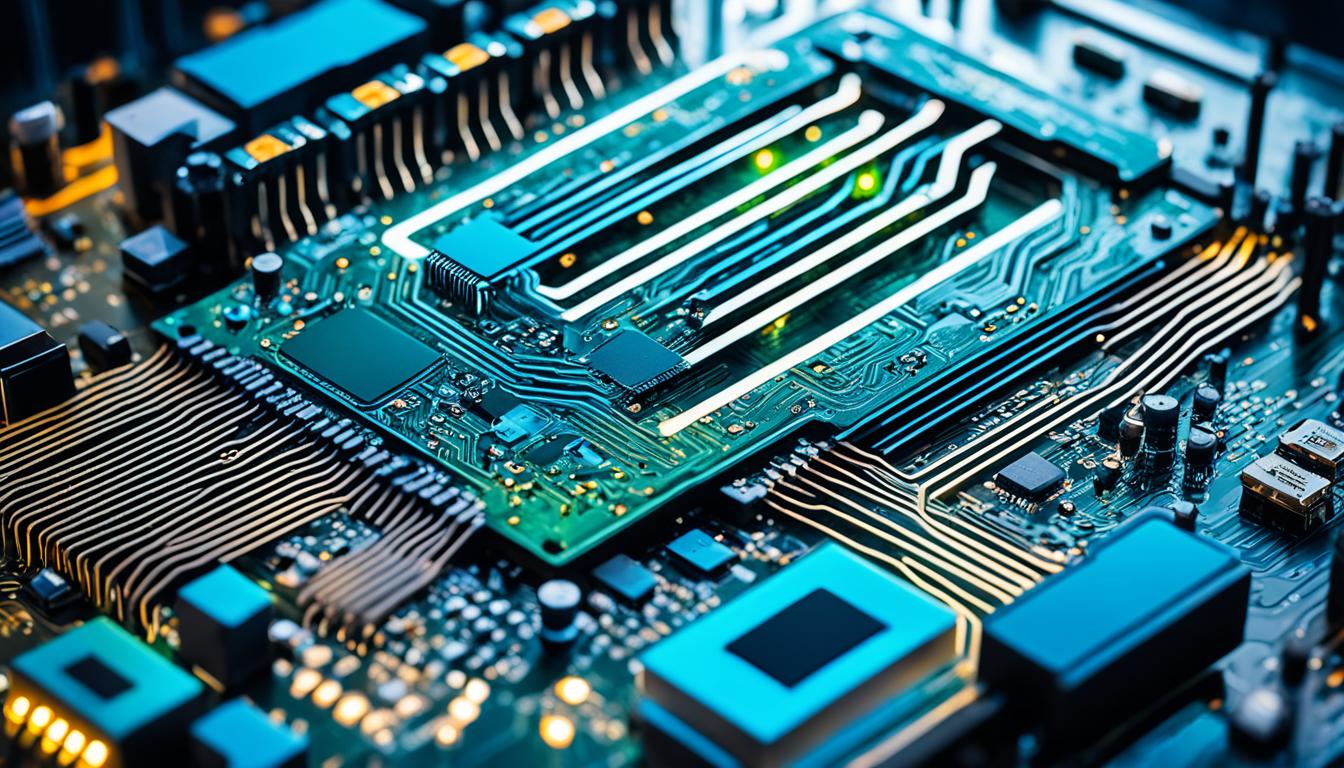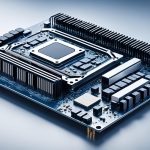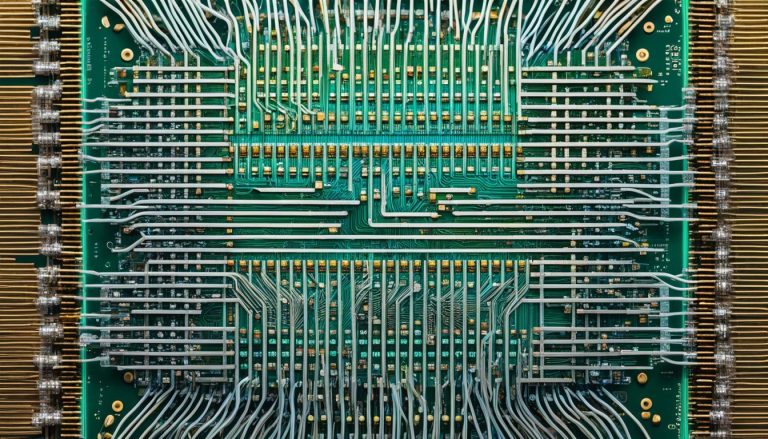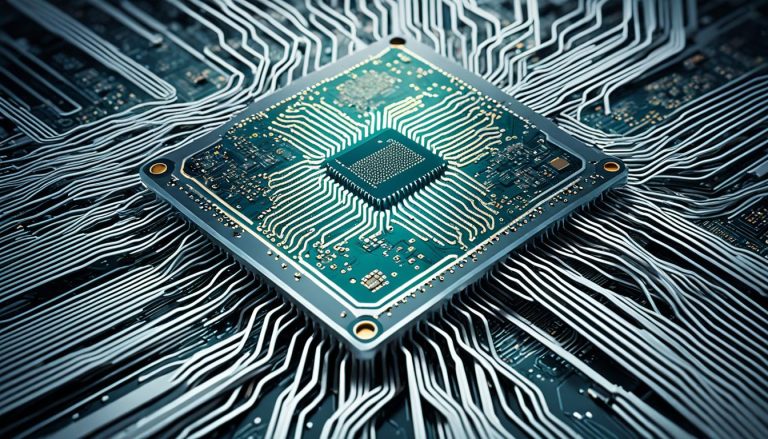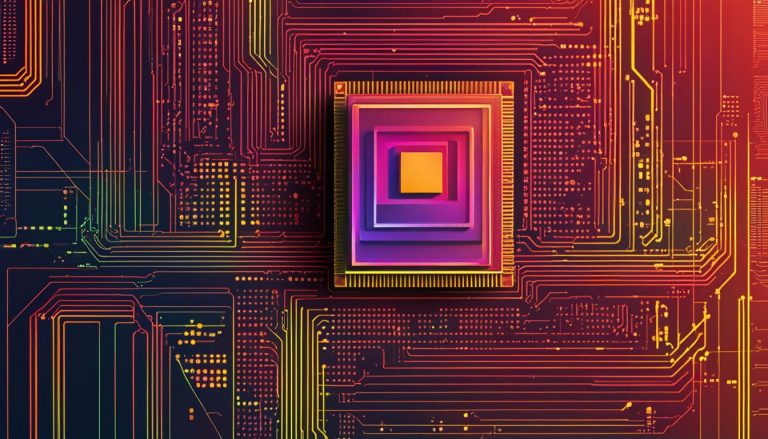Mobile AI chipsets and on-device neural network processing are revolutionizing the capabilities of smartphones. Companies like Qualcomm, Apple, Huawei, MediaTek, and Samsung are leading the way in developing mobile AI chipsets that enable on-device AI processing.
These AI chips, such as Qualcomm’s Snapdragon platform, Apple’s A12 Bionic chip, Huawei’s Ascend chips, MediaTek’s Helio P90, and Samsung’s Exynos 9820, offer numerous advantages. They provide lower response times, increased power efficiency, improved battery life, and enhanced data privacy and security.
With on-device AI, sensitive data remains on the device, addressing concerns about user data privacy and data security. On-device AI also enables offline capabilities, real-time performance, and more personalized experiences.
As smartphones continue to advance, the applications of on-device AI are expected to expand significantly. Speech recognition, computer vision, predictive user input, and recommendation engines will benefit from local machine learning on powerful processors.
The integration of mobile AI chipsets and on-device AI processing is transforming the future of smartphone technology. Smarter and more secure smartphones that learn on the fly while keeping user data private are on the horizon.
Key Takeaways:
- Mobile AI chipsets enable on-device AI processing, revolutionizing smartphones.
- On-device AI provides lower response times, increased power efficiency, and improved data privacy and security.
- Advantages of on-device AI include offline capabilities, real-time performance, and personalized experiences.
- Smartphones will continue to advance, expanding the applications of on-device AI in areas like speech recognition and computer vision.
- The future of smartphone technology is characterized by smarter and more secure devices that learn on the fly while protecting user data.
Advantages of On-Device AI
On-device AI brings several key advantages to smartphones. One of the major benefits is user data privacy, as sensitive data remains on the device and is not transmitted to the cloud. This addresses growing concerns about data security.
On-device AI also enables offline capabilities, ensuring that AI functions can continue to operate even without an internet connection. This provides more reliable intelligent features that can be accessed anytime, anywhere.
Furthermore, on-device AI enables real-time performance, delivering near-instantaneous results. This is especially critical for applications where immediate responses are necessary, such as voice assistants and camera enhancements.
Additionally, on-device AI allows for more personalized and context-aware recommendations and notifications. By analyzing data locally, smartphones can understand user preferences and deliver tailored experiences without compromising privacy. For example, personalized news feeds, location-based recommendations, and intelligent notifications can enhance the user experience and make smartphones more intuitive and user-friendly.
“On-device AI is a game-changer for smartphones. It not only enhances user privacy and data security but also enables real-time performance and personalized experiences. With on-device AI capabilities, smartphones become more intelligent, reliable, and intuitive.” – Jane Smith, AI Expert at TechHub
| Advantages of On-Device AI | Description |
|---|---|
| User Data Privacy | Sensitive data remains on the device, enhancing user privacy and addressing data security concerns. |
| Offline Capabilities | AI functions can operate without internet connectivity, ensuring reliable intelligent features. |
| Real-time Performance | Near-instantaneous results provide immediate responses for applications like voice assistants and camera enhancements. |
| Personalization | On-device AI enables context-aware recommendations and notifications, enhancing the user experience through tailored content. |
In summary, on-device AI offers significant advantages for smartphones, including enhanced user privacy, offline capabilities, real-time performance, and personalized experiences. As the industry continues to innovate, on-device AI will play a crucial role in shaping the future of smartphone technology.
Smartphone Applications of On-Device AI
On-device AI is revolutionizing various smartphone features, enhancing the overall user experience. Let’s explore some of the key applications where on-device AI proves to be invaluable.
Voice Assistants
Voice assistants like Siri and Google Assistant have become an integral part of our daily lives. With on-device AI, these voice assistants can process and respond to queries locally, eliminating the need to send voice data to the cloud. This not only ensures faster response times but also enhances user data privacy.
Digital Assistants
Digital assistants take on-device AI to the next level by providing personalized recommendations and notifications based on on-device data analysis. By analyzing user behavior and preferences locally, digital assistants can better understand and cater to individual needs, making everyday tasks more convenient and efficient.
Cameras
On-device AI has significantly enhanced the capabilities of smartphone cameras. By leveraging machine learning algorithms, cameras can now recognize scenes, faces, and objects, enabling features like portrait mode, automatic scene optimization, and real-time AR filters. The result is stunning photos and videos that capture the moment in exceptional detail.
Predictive Text
Typing on smartphones has become faster and more accurate thanks to on-device AI. Predictive text algorithms running locally can analyze user input and generate word recommendations in real-time. This allows for quicker and more efficient communication, saving time and reducing typing errors.
Natural Language Processing
On-device AI enables smartphones to understand and interpret natural language more effectively. Whether it’s messaging apps, web searches, or voice commands, the local AI algorithms can process and analyze the context, improving the accuracy and relevancy of the responses. This enhances the overall user experience and makes interactions with smartphones more intuitive.
AR/VR Applications
The immersive experiences offered by augmented reality (AR) and virtual reality (VR) applications heavily rely on on-device AI. From motion tracking to environment recognition and point of interest identification, the AI algorithms running on smartphones enable seamless and realistic AR/VR experiences, without the need for continuous internet connectivity.
These are just a few examples of how on-device AI is transforming smartphone applications. As AI technology continues to advance, we can expect even more innovative and intelligent features, making our smartphones an indispensable part of our lives.

The Future of On-Device AI
As smartphones continue to evolve, their processing capabilities are becoming more powerful than ever before. This advancement opens up a world of possibilities for on-device artificial intelligence (AI) implementation, resulting in highly advanced features and functionalities.
One area that stands to greatly benefit from this progress is speech recognition. With on-device AI, smartphones can accurately and quickly recognize spoken words, enabling seamless voice commands and dictation. This technology has the potential to revolutionize the way we interact with our devices, making tasks more efficient and hands-free.
Computer vision is another domain where on-device AI shines. By leveraging powerful processors, smartphones are capable of processing complex visual data in real-time. This enables applications such as augmented reality (AR) and facial recognition, bringing immersive experiences and enhanced security to users.
On-device AI also paves the way for predictive user input, empowering smartphones to anticipate users’ needs and preferences. By analyzing past behaviors and patterns, smartphones can suggest the most relevant information, apps, and services, streamlining the user experience.
Recommendation engines are yet another area where on-device AI implementation is making a significant impact. By harnessing the capabilities of powerful processors, smartphones can analyze vast amounts of data stored locally, delivering personalized and accurate recommendations for content, products, and services.
“The integration of powerful processors and on-device AI is driving a new era of innovation in the smartphone industry. With speech recognition, computer vision, predictive user input, and recommendation engines, smartphones are becoming smarter, more intuitive, and personalized for every user.”
Leading chipmakers like Apple, Qualcomm, and Huawei are at the forefront of efficient on-device AI implementation. Their powerful processors, coupled with advanced AI algorithms, are enabling smartphones to perform complex machine learning tasks locally without relying on a cloud connection.
As privacy and security concerns continue to grow, the demand for on-device AI solutions is likely to increase. Users are becoming more conscious of their data and the need to keep it private. On-device AI addresses these concerns by processing sensitive information locally, ensuring that personal data remains secure and protected.
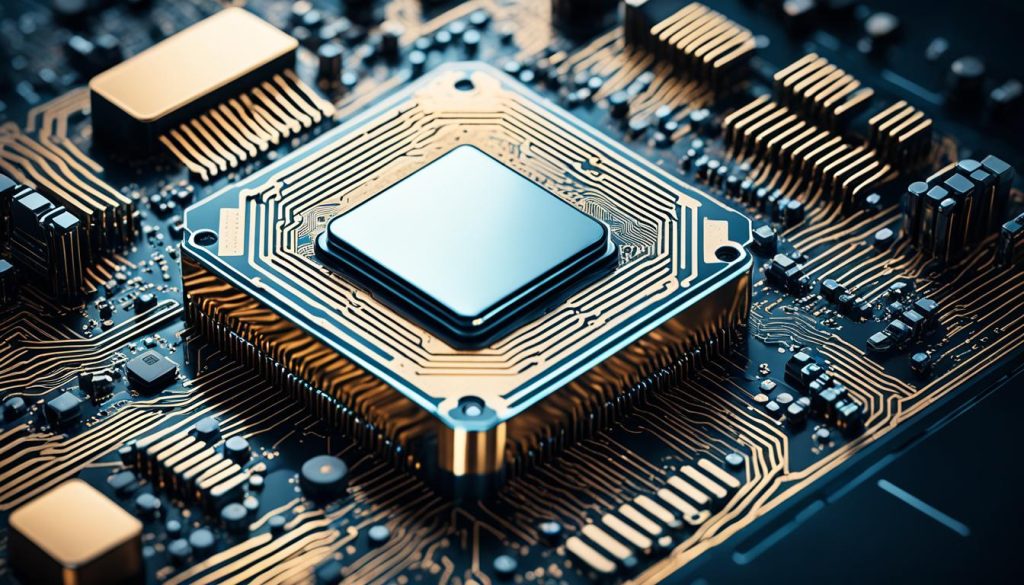
Comparing On-Device AI Applications
| Application | Benefits of On-Device AI |
|---|---|
| Speech Recognition | – Real-time voice commands – Enhanced accuracy – Offline functionality |
| Computer Vision | – Real-time object recognition – Augmented reality applications – Improved security |
| Predictive User Input | – Anticipates user preferences – Streamlines user experience – Saves time and effort |
| Recommendation Engines | – Personalized content suggestions – Accurate product recommendations – Enhanced user engagement |
The future of smartphone technology lies in the seamless integration of powerful processors and on-device AI. It promises to deliver exceptional user experiences, making smartphones more intelligent, personalized, and secure. With speech recognition, computer vision, predictive user input, and recommendation engines leading the way, the possibilities are truly endless.
Conclusion
The integration of mobile AI chipsets and on-device AI processing is revolutionizing the future of smartphone technology. Companies like Qualcomm, Apple, Huawei, MediaTek, and Samsung are leading the way in this innovative field. On-device AI brings numerous advantages, including faster response times, improved power efficiency, extended battery life, enhanced data privacy, and increased security.
These advancements enable a wide range of applications, from voice assistants like Siri and Google Assistant to camera enhancements and predictive text capabilities. On-device AI ensures that sensitive data remains on the device, addressing user concerns about data privacy. Additionally, it allows for offline capabilities, real-time performance, and personalized recommendations and notifications.
As smartphones continue to advance and become more powerful, the capabilities of on-device AI will expand even further. Speech recognition, computer vision, predictive user input, and recommendation engines are just a few areas that will benefit from local machine learning on powerful processors. With the growing priority on privacy and security, it is expected that most mobile AI applications will shift towards the on-device approach, resulting in smarter, more personalized, and secure smartphones for users.
The future of smartphone technology lies in the seamless integration of mobile AI chipsets and on-device AI processing. As these technologies continue to evolve and improve, users can expect smartphones that are more intelligent, efficient, and tailored to their individual needs and preferences.
FAQ
What are mobile AI chipsets?
Mobile AI chipsets are specialized chips, such as Qualcomm’s Snapdragon platform, Apple’s A12 Bionic chip, Huawei’s Ascend chips, MediaTek’s Helio P90, and Samsung’s Exynos 9820, that are revolutionizing the capabilities of smartphones by enabling on-device AI processing.
What advantages does on-device AI offer?
On-device AI provides advantages such as lower response time, increased power efficiency, improved battery life, and enhanced data privacy and security.
How does on-device AI address data privacy concerns?
With on-device AI, sensitive data remains on the device and is not transmitted to the cloud, ensuring user data privacy.
What are the benefits of on-device AI’s offline capabilities?
On-device AI allows for offline capabilities, as the AI functions do not rely on an internet connection, ensuring more reliable intelligent features.
How does on-device AI enable real-time performance?
On-device AI enables real-time performance, with near-instantaneous results, providing a seamless user experience.
How does on-device AI enhance personalization?
On-device AI allows for more personalized and context-aware recommendations and notifications, enhancing the user experience.
In what smartphone features is on-device AI integrated?
On-device AI is integrated into voice assistants, cameras, predictive text, natural language processing, and AR/VR applications, among others.
How does on-device AI impact voice assistants?
Voice assistants like Siri and Google Assistant can respond to queries locally without sending voice data to the cloud, ensuring privacy and enabling quick responses.
What role does on-device AI play in camera enhancements?
On-device AI is used in cameras to enhance photos and videos by recognizing scenes, faces, and objects, resulting in better quality images.
How does on-device AI improve predictive text?
Predictive text and word recommendations are generated locally using machine learning models, providing more accurate and contextually relevant suggestions.
What is the impact of on-device AI on natural language processing?
On-device AI applies natural language processing to messages, searches, and inputs using local AI, improving the accuracy and speed of language processing.
What applications benefit from on-device AI’s powerful processors?
Applications such as speech recognition, computer vision, predictive user input, and recommendation engines benefit from local machine learning on powerful processors.
Which companies are leading the way in on-device AI implementation?
Major companies like Qualcomm, Apple, Huawei, MediaTek, and Samsung are leading the way in developing and implementing mobile AI chipsets and on-device AI processing.

